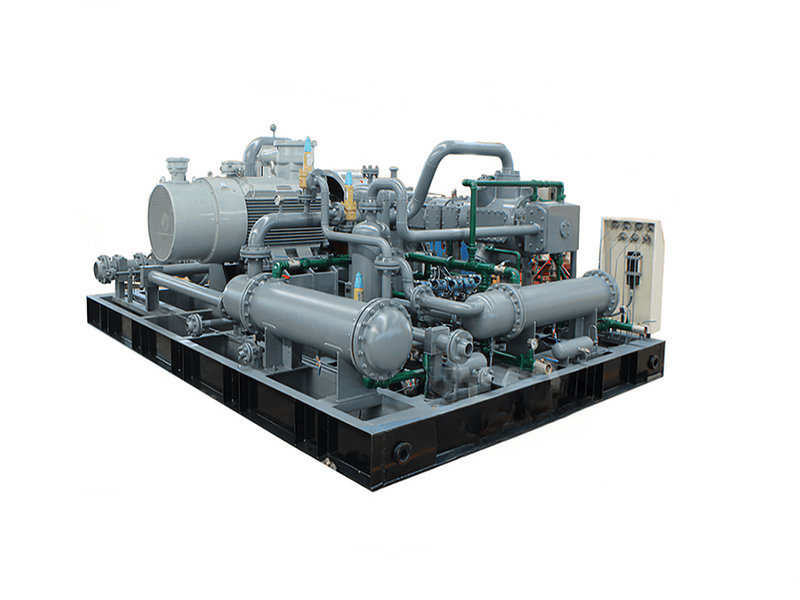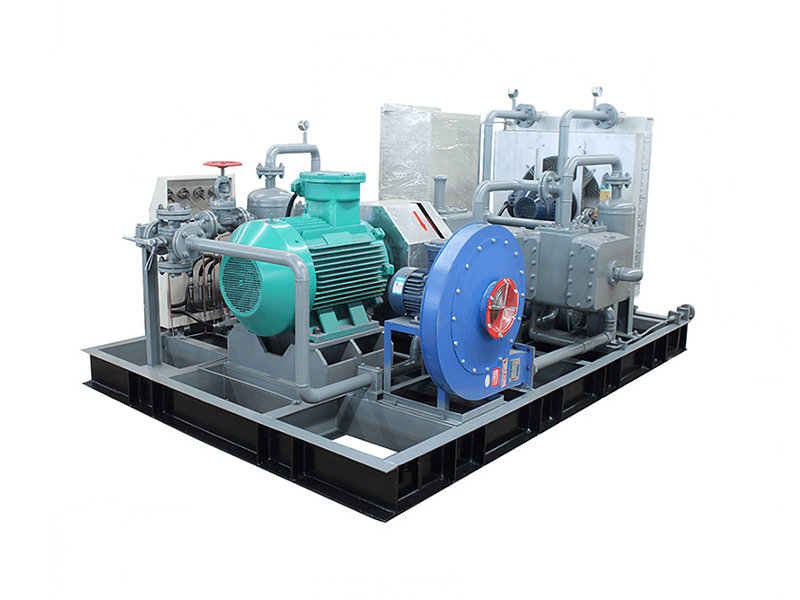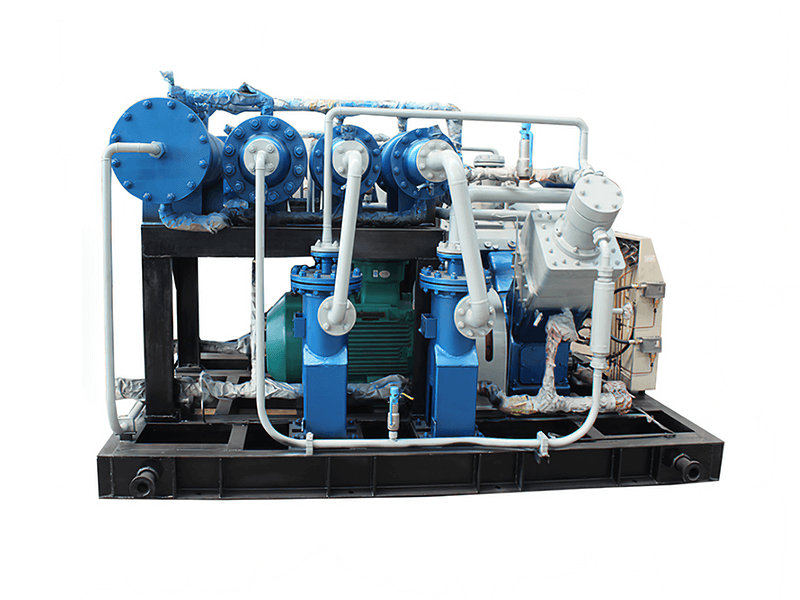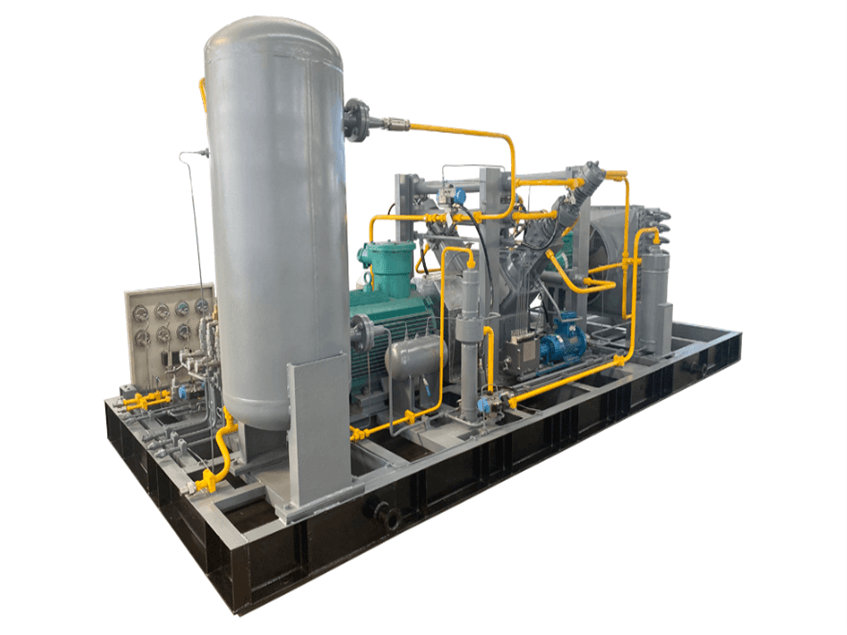Gas compressors play a crucial role in various industries where the compression of gases is required for different applications. The technical requirements for gas compressors can vary depending on the specific industry and its application. Here are some examples of technical requirements for gas compressors in different industries:
1. Oil and Gas Industry:
- High Compression Ratios: Gas compressors in the oil and gas industry often require the ability to achieve high compression ratios to increase the pressure of natural gas or associated gases for transportation, injection, or processing purposes.
- Robust Construction: Oil and gas operations take place in harsh environments, including extreme temperatures, corrosive atmospheres, and rugged terrains. Gas compressors in this industry need to be built with durable materials and robust construction to withstand these conditions.
- Safety Features: Compressors used in the oil and gas industry require safety systems such as emergency shutdown systems, pressure relief valves, and gas detection systems to ensure safe operation and prevent accidents.
- Skid-Mounted or Trailer-Mounted Design: Portability is often a requirement in the oil and gas industry, as compressors may need to be moved between different well sites or locations within the oil field. Hence, compressors are often designed to be skid-mounted or trailer-mounted for easy transportation.
- Control and Monitoring Systems: Oil and gas compressors typically incorporate advanced control and monitoring systems for real-time monitoring, data logging, and automated control of compressor parameters such as pressure, temperature, and performance.
2. Chemical and Petrochemical Industry:
- Process-Specific Gas Handling: Gas compressors in the chemical and petrochemical industry may be required to handle specific gases used in various chemical processes, such as hydrogen, ethylene, ammonia, or synthesis gases.
- High Efficiency: Compressors in this industry need to be highly efficient to minimize energy consumption and operating costs in large-scale chemical production processes.
- Compliance with Industry Standards: Gas compressors in the chemical and petrochemical industry must adhere to industry standards and regulations for safety, environmental considerations, and process compatibility.

3. Power Generation Industry:
- Large Capacity and High Flow Rates: Gas compressors used in power generation facilities, such as natural gas power plants or gas turbine installations, often require high capacity and flow rates to deliver compressed gas to the turbines efficiently.
- Precise Pressure Control: Gas compressors in the power generation industry may need to maintain precise pressure control to ensure optimal turbine performance and reliability.
- Integration with Power Generation Systems: Compressors may need to be compatible with the overall power generation system, including the ability to synchronize with electrical grids or integrate with turbine control systems.
4. Refrigeration and HVAC Industry:
- Oil-Free Operation: Gas compressors used for refrigeration and HVAC applications often require oil-free operation to prevent contamination of the refrigerant or air being compressed.
- Low Noise Levels: Compressors in this industry may need to operate with low noise levels to meet noise regulations and ensure comfortable and quiet environments in residential, commercial, or industrial settings.
- Energy Efficiency: Energy-efficient compressors are desirable in the refrigeration and HVAC industry to minimize power consumption and operating costs.
5. Manufacturing and Industrial Applications:
- Customizable Configurations: Gas compressors used in manufacturing and industrial applications often require customizable configurations to meet specific process requirements, such as flow rates, pressure ranges, and gas compatibility.
- High Reliability and Continuous Operation: Compressors in this industry need to be highly reliable and capable of continuous operation to support uninterrupted manufacturing processes.
- Integrated Control Systems: Gas compressors may need to integrate with the overall control systems of manufacturing facilities, allowing for coordinated operation and communication with other equipment and processes.
6. Food and Beverage Industry:
- Sanitary Design: Gas compressors used in the food and beverage industry must have a sanitary design to ensure product purity and prevent contamination. This includes features such as smooth surfaces, easy cleanability, and food-grade materials.
- Oil-Free and Contaminant-Free Compression: Compressors in this industry need to provide oil-free and contaminant-free compression to maintain the quality and safety of food and beverage products.
- Compliance with Food Safety Standards: Gas compressors must meet food safety standards and regulations, such as those set by organizations like the Food and Drug Administration (FDA) or the European Food Safety Authority (EFSA).
7. Medical and Healthcare Industry:
- Clean and Dry Air: Gas compressors used in medical and healthcare applications, such as hospitals or dental clinics, must provide clean and dry compressed air to ensure patient safety and prevent contamination of medical equipment.
- Oil-Free Operation: Compressors in this industry often require oil-free operation to avoid introducing oil aerosols or contaminants into the medical air supply.
- Compliance with Medical Standards: Gas compressors must comply with medical standards and regulations, such as those outlined in the ISO 13485 standard for medical devices.
8. Aerospace Industry:
- High Pressure Ratios: Gas compressors used in aerospace applications, such as aircraft engines or rocket propulsion systems, often require the ability to achieve very high pressure ratios to optimize engine performance in the thin air at high altitudes.
- Lightweight and Compact Design: Compressors in the aerospace industry need to be lightweight and compact to minimize the overall weight and size of the aircraft or spacecraft.
- High Efficiency and Thrust-to-Weight Ratio: Gas compressors should be highly efficient to maximize the thrust-to-weight ratio and fuel efficiency of aerospace propulsion systems.
9. Mining Industry:
- Dust and Particle Filtration: Gas compressors used in mining operations may require built-in filtration systems to remove dust, particles, and contaminants from the compressed air, ensuring clean and safe air supply for underground operations or pneumatic tools.
- Explosion-Proof Design: Compressors in mining applications often need to be designed to be explosion-proof or intrinsically safe to mitigate the risk of igniting flammable gases or dust in hazardous mining environments.
- Robust and Heavy-Duty Construction: Mining compressors should have robust construction and be able to withstand harsh operating conditions, including high temperatures, vibrations, and dust exposure.
10. Environmental and Wastewater Treatment:
- Low Noise and Vibration Levels: Compressors used in environmental and wastewater treatment applications often need to operate with low noise and vibration levels to minimize disturbances in residential or urban areas.
- Corrosion-Resistant Materials: Gas compressors may require corrosion-resistant materials, coatings, or treatments to withstand corrosive gases or aggressive wastewater environments.
- Energy Efficiency: Energy-efficient compressors are desirable in environmental and wastewater treatment applications to minimize power consumption and operating costs.
11. Research and Development:
- Variable Capacity and Control: Gas compressors used in research and development settings may require variable capacity and control options to accommodate a wide range of experiments, tests, or simulations with varying gas flow rates and pressures.
- Instrumentation and Data Logging: Compressors in research and development applications often incorporate instrumentation and data logging capabilities to monitor and record compressor performance parameters for analysis and research purposes.
These examples highlight additional industries and their specific technical requirements for gas compressors. It's important to note that the requirements can vary significantly within each industry and depend on factors such as the specific application, environmental conditions, safety considerations, and regulatory compliance.


























